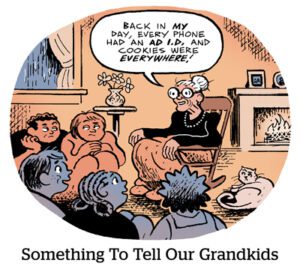What does “Catfish” have in common with cookies?
Max Joseph, the filmmaker and producer of “Catfish,” an MTV reality show that exposes people who lie about themselves online, is helping Israel-based monetization platform Perion promote its cookieless technology product, called SORT, with a satirical short film that highlights the perils of data collection on the internet and the great lengths one would have to go to in order to avoid it completely.
(For example, the protagonist turns off GPS in favor of paper maps, replaces dating apps with fax machines, burns off his fingertips and eventually chops off a limb and moves to Norway as a pirate in disguise. Anyway, it makes sense in context.)
The point is, people can’t be expected to write off technology as a means to protecting their personal privacy online.
Responsibility for data privacy protection should start with the companies that collect consumer data, Perion CEO Doron Gerstel told AdExchanger after a screening of the film in New York City this week.
(Although don’t judge Perion for the cookie permissions that still pop up on its own site – cookieless is a work in progress, after all.)
Perion first launched SORT in October. Rather than third-party cookies, the tool relies on contextual signals and user actions such as clickthrough rates (CTR) to determine which segments, so-called “smart groups,” are most likely to respond to display or video ads across any device.
Does contextual work?
The challenge is keeping the scale and performance of contextual on par with that of cookie-based targeting.
Although the scale of contextual is limited, “the more campaigns we run, the more granular contextual signals we [amass] and the more [advertising] budgets we attract,” Gerstel said.
Perion, which has run 125 campaigns for clients using SORT since its launch last year, found that the clickthrough rates for contextual campaigns were twice as high as third-party cookie-based campaigns. The contextual campaigns also generated higher return on ad spend.
But SORT also has a consumer-facing element.
Each ad served through SORT includes a logo at the bottom with three colored circles inside of a shield, meant to signify to users that the ad is safe to click because it won’t collect any personal data. It’s a bit like the blue verification check on Twitter, said Gerstel, who claims the symbol is part of what’s helping drive high CTRs.

And Perion doesn’t directly integrate SORT with other ad tech companies because it’s too risky from a data protection standpoint, he said.
For example, publishers are increasingly relying on “anonymized” identifiers, such as hashed emails. But hashed email-based IDs can still be used to identify an individual device, Gerstel said, which is problematic considering that they’re being positioned as a privacy-safe alternative to third-party cookies.
Gerstel said he questions the viability of solutions that are dependent on hashed IDs and emails, such as The Trade Desk’s UID 2.0.
But even if Google wasn’t planning to end support for third-party cookies in Chrome, people have become a lot more aware of online data collection.
Joseph hatched his idea for the film about SORT based on his work producing MTV’s “Catfish,” a TV show about fake or misleading online relationships.
“Once we started the first season [in 2012] and told people what our new show was about, I knew this idea would strike a nerve,” said Joseph, who noted that being conned into an online relationship doesn’t only happen in romance. Brands do it with consumers all the time.
People tend to assume that others, including advertisers, have their best interests at heart, which isn’t always the case. And what users can do to protect their individual data is mostly limited to customizing the location and data tracking settings on their devices – which most people don’t take the time to do.
“There was an earlier version of the film that made fun of all the different customization settings available for tracking in the iPhone,” Joseph told AdExchanger. But early screeners said they didn’t use most of those settings, opting rather to opt out through the “Ask App Not To Track” modal.
Although the film is itself an ad for an ad tech product, albeit a cookieless one, Joseph said he hopes to raise data privacy awareness both with consumers and within the media and advertising industry.
Many publishers and brands have a direct relationship with customers – and therefore an obligation to respect user privacy.
Agencies, for one, are starting to get serious about testing privacy-safe solutions, including contextual targeting.
In the past, “we felt we did our due diligence with brand safety,” said Stephanie Ventura, an associate director of programmatic at MediaCom who was also at the film screening. User safety online wasn’t a priority.
“But now we also have to advise our clients on [complying with] the new privacy regulations coming out, including California’s CPRA and updates to iOS,” she said. “And we’re already testing contextual solutions to show clients that they work – we’re not waiting for doomsday.”
This article has been updated for accuracy.















